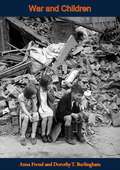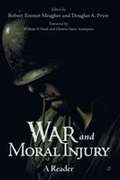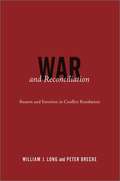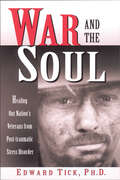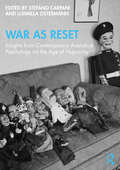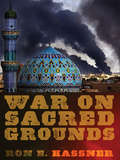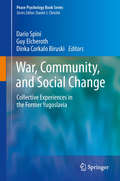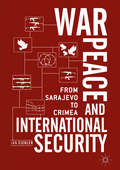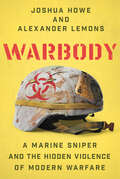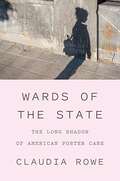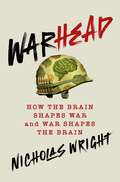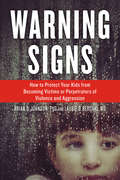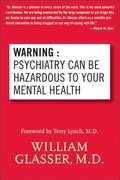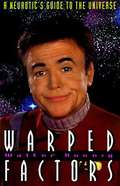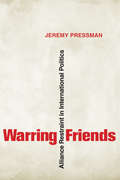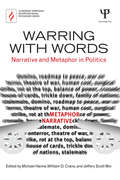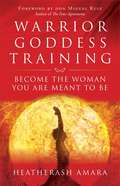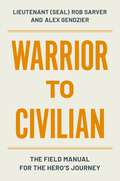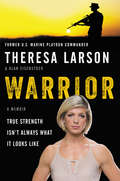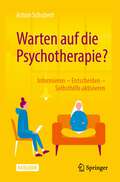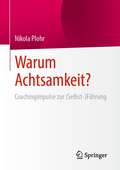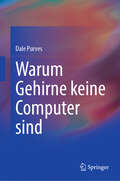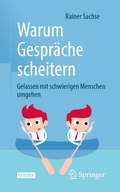- Table View
- List View
War and Children
by Anna Freud Dorothy T. BurlinghamThis book looks at the record of children in modern war told honestly and completely, by two of the world's outstanding child psychologists, Anna Freud and Dorothy Burlingham. The work focuses on how war affects psychological development in children; the need for personal attachment, for emotional stability, and for permanency of educational influence.
War and Moral Injury: A Reader
by Robert Emmet Meagher Douglas A. PryerMoral Injury has been called the "signature wound" of today's wars. It is also as old as the human record of war, as evidenced in the ancient war epics of Greece, India, and the Middle East. But what exactly is Moral Injury? What are its causes and consequences? What can we do to prevent or limit its occurrence among those we send to war? And, above all, what can we do to help heal afflicted warriors? This landmark volume provides an invaluable resource for those looking for answers to these questions. Gathered here are some of the most far-ranging, authoritative, and accessible writings to date on the topic of Moral Injury. Contributors come from the fields of psychology, theology, philosophy, psychiatry, law, journalism, neuropsychiatry, classics, poetry, and, of course, the profession of arms. Their voices find common cause in informing the growing, international conversation on war and war's deepest and most enduring invisible wound. Few may want to have this myth-challenging, truth-telling conversation, but it is one we must have if we truly wish to help those we send to fight our wars.
War and Reconciliation: Reason and Emotion in Conflict Resolution
by William J. Long Peter BreckeThis book is the first systematic examination of the impact of reconciliation on restoring and maintaining peace following civil and international conflicts. Through eleven comparative case studies of civil war and eight of international conflict, it constructs a surprising explanation for when and why reconciliation restores social order. The civil war cases reveal that successful reconciliation is associated with a process of national forgiveness, not merely negotiated settlement. All successful cases followed a four-step pattern of public truth telling, justice short of revenge, redefinition of the identities of former belligerents, and a call for a new relationship. The book argues that success is not solely the result of rational choice decision making. It proposes a hypothesis, grounded in evolutionary psychology, that to restore social order we use emotional/cognitive techniques that have evolved to ensure human survival. On the international level, however, successful reconciliation was not a part of a forgiveness process. Reconciliation was successful in bringing about sustained peace when it was associated with a signaling process -- an exchange of costly, novel, voluntary, and irrevocable concessions in a negotiated bargain. This result is consistent with realist notions of the limits of international society and illustrates the context in which a rational choice model is appropriate. The book's approach, integrating emotion with reasoning and linking political science to scientific research in other disciplines, particularly biology and neuroscience, has broad implications for social science theory.
War and the Soul
by Edward TickIn 2010 the Department of Veterans Affairs cited 171,423 Iraq and Afghanistan war veterans diagnosed with PTSD, out of 593,634 total patients treated. That's almost 30 percent; other statistics show 35 percent. Such vets typically can't hold jobs. They are incapable of intimacy, creative work, and self-realization. Some can't leave the house because they are afraid they will kill or be killed.The key to healing, says psychotherapist Ed Tick, is in how we understand PTSD. In war's overwhelming violence, the soul-the true self-flees and can become lost for life. He redefines PTSD as a true identity disorder, with radical implications for therapy. First, Tick establishes the traditional context of war in mythology and religion. Then he describes in depth PTSD in terms of identity issues. Finally, drawing on world spiritual traditions, he presents ways to nurture a positive identity based in compassion and forgiveness.War and the Soul will change the way we think about war, for veterans and for all those who love and want to help them. It shows how to make the wounded soul whole again. When this work is achieved, PTSD vanishes and the veteran can truly return home.
War and the Soul: Healing Our Nation's Veterans from Post-tramatic Stress Disorder
by Edward Tick<p>War and PTSD are on the public's mind as news stories regularly describe insurgency attacks in Iraq and paint grim portraits of the lives of returning soldiers afflicted with PTSD. These vets have recurrent nightmares and problems with intimacy, can't sustain jobs or relationships, and won't leave home, imagining "the enemy" is everywhere. <p>Dr. Edward Tick has spent decades developing healing techniques so effective that clinicians, clergy, spiritual leaders, and veterans' organizations all over the country are studying them. This book, presented here in an audio version, shows that healing depends on our understanding of PTSD not as a mere stress disorder, but as a disorder of identity itself. In the terror of war, the very soul can flee, sometimes for life. Tick's methods draw on compelling case studies and ancient warrior traditions worldwide to restore the soul so that the veteran can truly come home to community, family, and self.</p>
War as Reset: Insights from Contemporary Analytical Psychology on the Age of Hypocrisy
by Stefano Carpani Ludmilla OstermannIn an age continuously shaped and shocked by wars and societal crises, this book serves as an antidote to superficial media frenzy.Exploring the interplay between the insights from analytical psychology and global dynamics, it unravels the meanings behind our shared fears and invites readers to confront challenging truths shaping our present and future. Part I of this book explores the multifaceted aspect of war, as Stefano Carpani interviews authoritative figures from the fields of Jungian psychoanalysis, sociology, history, and religion. Their insights shed light on the meaning of war, the concept of fatherland, the masculine nature of war, and the potential for total conflict. In Part II of the book, Jungian therapists reflect on their experiences, offering insights into the impact of war on the field of analysis, presenting a comprehensive exploration of war from interdisciplinary perspectives. The contributions touch upon themes like the Israeli–Palestinian conflict, healing through arts-based research, violence practiced by the state in Argentina, sexual violence, and the effect of the Irish Republican Army (IRA) on Irish society.This book proposes that war can serve as a reset mechanism, and that our era can be termed the one of hypocrisy. It will be of interest to academics, scholars, and students within the fields of analytical psychology, psychosocial studies, psychoanalysis, and sociology.
War on Sacred Grounds
by Ron E. HassnerSacred sites offer believers the possibility of communing with the divine and achieving deeper insight into their faith. Yet their spiritual and cultural importance can lead to competition as religious groups seek to exclude rivals from practicing potentially sacrilegious rituals in the hallowed space and wish to assert their own claims. Holy places thus create the potential for military, theological, or political clashes, not only between competing religious groups but also between religious groups and secular actors. In War on Sacred Grounds, Ron E. Hassner investigates the causes and properties of conflicts over sites that are both venerated and contested; he also proposes potential means for managing these disputes. Hassner illustrates a complex and poorly understood political dilemma with accounts of the failures to reach settlement at Temple Mount/Haram el-Sharif, leading to the clashes of 2000, and the competing claims of Hindus and Muslims at Ayodhya, which resulted in the destruction of the mosque there in 1992. He also addresses more successful compromises in Jerusalem in 1967 and Mecca in 1979. Sacred sites, he contends, are particularly prone to conflict because they provide valuable resources for both religious and political actors yet cannot be divided. The management of conflicts over sacred sites requires cooperation, Hassner suggests, between political leaders interested in promoting conflict resolution and religious leaders who can shape the meaning and value that sacred places hold for believers. Because a reconfiguration of sacred space requires a confluence of political will, religious authority, and a window of opportunity, it is relatively rare. Drawing on the study of religion and the study of politics in equal measure, Hassner's account offers insight into the often-violent dynamics that come into play at the places where religion and politics collide.
War, Community, and Social Change: Collective Experiences in the Former Yugoslavia
by Dinka Corkalo Biruski Guy Elcheroth Dario SpiniCollective experiences in the former Yugoslavia documents and analyses how social representations and practices are shaped by collective violence in a context of ethnic discourse. What are the effects of violence and what are the effects of collectively experienced victimisation on societal norms, attitudes and collective beliefs? This volume stresses that mass violence has a de- and re-structuring role for manifold psychosocial processes. A combined psychosocial approach draws attention to how most people in the former Yugoslavia had to endure and cope with war and dramatic societal changes and how they resisted and overcame ethnic rivalry, violence and segregation. It is a departure from the mindset that depict most people in the former Yugoslavia as either blind followers of ethnic war entrepreneurs or as intrinsically motivated for violence by deep-rooted intra-ethnic loyalties and inter-ethnic animosities.
War, Peace and International Security
by Jan EichlerThis book examines and explains the dialectic of war and peace between the outbreak of WWI and the Russian annexation of Crimea in 2014. The theoretical inspiration is built upon Galtung's concept of negative and positive peace, Aron#65533;s distinction between strategy and diplomacy, and Carr#65533;s theory of periodization. Here, the author compares globalization with the interwar period and examines how the first decade#65533;s positive peace, diplomacy, and big hopes were replaced by negative peace, and explains the growing role of military strategy which culminated after the Russian annexation of Crimea and the following military incidents between NATO and Russia. This volume will be of interest to teachers, students, and researchers in the fields of modern history, international security and peace studies.
Warbody: A Marine Sniper and the Hidden Violence of Modern Warfare
by Joshua Howe Alexander LemonsA friendship between an environmental historian and a chronically ill US Marine yields a powerful exploration into the toxic effects of war on the human body. Alexander Lemons is a Marine Corps scout sniper who, after serving multiple tours during the Iraq War, returned home seriously and mysteriously ill. Joshua Howe is an environmental historian who met Lemons as a student in one of his classes. Together they have crafted a vital book that challenges us to think beyond warfare’s acute violence of bullets and bombs to the “slow violence” of toxic exposure and lasting trauma. In alternating chapters, Lemons vividly describes his time in Fallujah and elsewhere during the worst of the Iraq War, his descent into a decade-long battle with mysterious and severe sickness, and his return to health; Howe explains, with clarity and scientific insight, the many toxicities to which Lemons was exposed and their potential consequences. Together they cover the whirlwind of toxic exposures military personnel face from the things they touch and breathe in all the time, including lead from bullets, jet fuel, fire retardants, pesticides, mercury, dust, and the cocktail of toxicants emitted by the open-air “burn pits” used in military settings to burn waste products like paint, human waste, metal cans, oil, and plastics. They also consider PTSD and traumatic brain injury, which are endemic among the military and cause and exacerbate all kinds of physical and mental health problems. Finally, they explore how both mainstream and alternative medicine struggle to understand, accommodate, and address the vast array of health problems among military veterans. Warbody challenges us to rethink the violence we associate with war and the way we help veterans recover. It is a powerful book with an urgent message for the nearly twenty million Americans who are active military or veterans, as well as for their families, their loved ones, and all of us who depend on their service.
Wards of the State: The Long Shadow of American Foster Care
by Claudia RoweTOLD THROUGH THE STORIES OF SIX FORMER FOSTER YOUTH, A JOLTING EXPLORATION OF A BROKEN SYSTEM FROM AN AWARD-WINNING JOURNALIST. <P><P> By the time Maryanne was eighteen years old, she was on trial for murder. In and out of foster homes since the fourth grade, she had been trafficked and assaulted, and as a runaway on the streets, she finally pointed a gun at a man and pulled the trigger. She fled, but with no family and few real friends, it didn't take long for the police to catch up with her. In court, Maryanne's defense blamed the foster care system itself. While the state of Washington brushed off that argument, journalist Claudia Rowe decided to look closer. <P><P> Wards of the State widens the lens on an eye-opening case that began as a true-crime Inquiry and grew into a propulsive exploration of the foster-care-to-prison pipeline. Overseeing nearly half a million children, at a cost of $30 billion a year, the US foster system channels far more kids into locked cells than college classrooms. By conservative estimates, at least 20 percent of state prison inmates are former foster youth, and in some lockups more than half the inmates were raised by the state. <P><P> Following six foster kids through the courtrooms, group homes, detention halls, and adoption fairs that framed their lives over four decades, Rowe illustrates exactly where, when, and how the system twists children into crime statistics. With perspectives from the psychologists, judges, advocates, and foster parents who witnessed their struggle for survival, Wards of the State pulls back the curtain on a child welfare system that has become an integral part of America's mass incarceration complex.
Warhead: How the Brain Shapes War and War Shapes the Brain
by Nicholas WrightFrom Dr Nicholas Wright, leading neuroscientist and adviser to the Pentagon, discover the new science behind warfare. Why did France lose to the Nazis, despite its defenders having more tanks, troops, and guns? How did we bring peace to Germany after World War Two? How do you know if you can trust an ally? How can we make clearer decisions under pressure? In Warhead, Nicholas Wright takes us on a fascinating journey through the brain to show us how it shapes our behaviour in conflict and war. Drawing on his work as a neuroscientist, and over a decade advising the Pentagon and the UK Government, Wright reveals that, whether we like it or not, the brain is wired for conflict – in the office or on the battlefield. With a unique framework that helps explain today’s rising tensions and how to defuse them, Warhead brings cutting-edge research to life through battle stories from history. What was it like for a foot soldier at the Battle of Waterloo in 1815, or in China's Red Army as it fought to survive and triumph throughout the 1930s and 40s? How could leaders such as World War Two tank commanders, Shaka Zulu, or Winston Churchill see through the fog of conflict, make better decisions, and communicate with those who must carry those decisions out? How will human conflict shape our future technologies? In an increasingly dangerous world that threatens our values and success, Warhead is an essential read to understand why we fight, lose and win wars. Because self-knowledge is power.
Warning Signs: How to Protect Your Kids from Becoming Victims or Perpetrators of Violence and Aggression
by Brian Johnson Laurie BerdahlWarning Signs provides practical methods to reduce harm to and by children. Doctors Johnson and Berdahl present the most common risk factors and warning signs, along with practical parenting advice and strategies for raising strong, safe kids and protecting them from becoming either perpetrators or victims. They explain how the "old" risk factors--child abuse and neglect, domestic violence, sexual assault, and poverty--have been compounded by new ones in the past 20 years, such as violent media, kids' entitled attitudes, parents' fear of intervention, and increases in childhood mental illness, disrupted families, substance use, bullying, access to weapons, and social media. They provide sample language for tough conversations with kids and with other adults. Full of specific, practical ideas, this book will appeal to parents who want to raise kind and compassionate children.
Warning: Psychiatry Can Be Hazardous to Your Mental Health
by William GlasserHow psychopharmacology has usurped the role of psychotherapy in our society, to the great detriment of the patients involved. William Glasser describes in Warning: Psychiatry Can Be Hazardous to Your Mental Health the sea change that has taken place in the treatment of mental health in the last few years. Millions of patients are now routinely being given prescriptions for a wide range of drugs including Ritalin, Prosac, Zoloft and related drugs which can be harmful to the brain. A previous generation of patients would have had a course of psychotherapy without brain-damaging chemicals. Glasser explains the wide implications of this radical change in treatment and what can be done to counter it.
Warped Factors: A Neurotic's Guide to the Universe
by Walter Koenig"Beneath the tinsel of Hollywood," Oscar Levant once said, "is the real tinsel." Beneath that lies a cornucopia of absurd behavior and bizarre experiences that rival the most creative silver screen fiction. As a young transplant from New York in the 1950s and '60s Walter Koenig quickly came to know Hollywood as a place of energy and opportunity where life's uncertainties loomed large. Launching an acting career in this unpredictable cultural cauldron, he wound his way through various misadventures before finding he had attained a degree of success that surprised even him. This is Koenig's story--from growing up as the neurotic child of Russian immigrants in 1940s Manhattan through his rise to Star Trek fame as Pavel Chekov, Russian navigator of the U.S.S. Enterprise, and beyond. Not a typical Hollywood memoir, Warped Factors is anything but aloof. Koenig's very human narrative is full of the kind of insecurities and quirks anyone can relate to. With wry wit, striking candor, and a true gift for storytelling, Koenig takes us on a sometimes bumpy but often hilarious trip through his galaxy. Blind faith and a healthy sense of irony seem to sustain him as he relates a steady stream of anecdotes, including: *** * Pitching a story to an NBC producer who is in the midst of an out-of-body experience; * Having a loaded gun placed in his ear by a jealous manager; * Performing a controversial play that was interrupted by someone believed to be a member of the American Nazi party dressed in the uniform of a Chicken Delight delivery boy; * Getting fired from a CBS movie of the week for staring at the director; * Being mistaken for a bellhop during a public appearance in his Star Trek uniform; * Declining a Star Trek convention attendee's invitation to help sacrifice a chicken in her hotel room. Of course, this amusing memoir also takes us behind the scenes of Star Trek, with fresh perspectives not only on the cast members themselves but also on the development and evolution of the megalithic sci-fi legend. In fact, Koenig includes a number of the script ideas he himself pitched over the years, including a proposed outline for Star Trek VI (one that saw the deaths of several main crew members, including Kirk) and several for The Next Generation series. Also included are Koenig's notes to producer Harve Bennett on Star Trek IT. The Wrath of Khan, as well as his commentary on several other projects. Finally, Koenig offers candid reflections not only on the Star Trek years but on his life and career since. Most notable are his well-received stints on stage and his current role as the insidious Alfred Bester on television's Babylon S. Enjoying both critical and popular success, Koenig has once again confirmed his enduring position in science fiction's acting pantheon.
Warring Friends: Alliance Restraint in International Politics (Cornell Studies in Security Affairs)
by Jeremy PressmanAllied nations often stop each other from going to war. Some countries even form alliances with the specific intent of restraining another power and thereby preventing war. Furthermore, restraint often becomes an issue in existing alliances as one ally wants to start a war, launch a military intervention, or pursue some other risky military policy while the other ally balks. In Warring Friends, Jeremy Pressman draws on and critiques realist, normative, and institutionalist understandings of how alliance decisions are made. Alliance restraint often has a role to play both in the genesis of alliances and in their continuation. As this book demonstrates, an external power can apply the brakes to an incipient conflict, and even unheeded advice can aid in clarifying national goals. The power differentials between allies in these partnerships are influenced by leadership unity, deception, policy substitutes, and national security priorities. Recent controversy over the complicated relationship between the U. S. and Israeli governments-especially in regard to military and security concerns-is a reminder that the alliance has never been easy or straightforward. Pressman highlights multiple episodes during which the United States attempted to restrain Israel's military policies: Israeli nuclear proliferation during the Kennedy Administration; the 1967 Arab-Israeli War; preventing an Israeli preemptive attack in 1973; a small Israeli operation in Lebanon in 1977; the Israeli invasion of Lebanon in 1982; and Israeli action during the Gulf War of 1991. As Pressman shows, U. S. initiatives were successful only in 1973, 1977, and 1991, and tensions have flared up again recently as a result of Israeli arms sales to China. Pressman also illuminates aspects of the Anglo-American special relationship as revealed in several cases: British nonintervention in Iran in 1951; U. S. nonintervention in Indochina in 1954; U. S. commitments to Taiwan that Britain opposed, 1954-1955; and British intervention and then withdrawal during the Suez War of 1956. These historical examples go far to explain the context within which the Blair administration failed to prevent the U. S. government from pursuing war in Iraq at a time of unprecedented American power.
Warring with Words: Narrative and Metaphor in Politics (Claremont Symposium on Applied Social Psychology Series)
by William D. Crano Michael Hanne Jeffrey Scott MioScholars in many of the disciplines surrounding politics explicitly utilize either a narrative perspective or a metaphor perspective (though rarely the two in combination) to analyze issues -- theoretical and practical, domestic and international -- in the broad field of politics. Among the topics they have studied are: competing metaphors for the state or nation which have been coined over the centuries in diverse cultures; the frequency with which communal and international conflicts are generated, at least in part, by the clashing religious and historical narratives held by opposing groups; the cognitive short-cuts employing metaphor by which citizens make sense of politics; the need for political candidates to project a convincing self-narrative; the extent to which the metaphors used to formulate social issues determine the policies which will be developed to resolve them; the failure of narratives around the security of the nation to take account of the individual experiences of women and children. This volume is the first in which eminent scholars from disciplines as diverse as social psychology, anthropology, political theory, international relations, feminist political science, and media studies, have sought to integrate the narrative and the metaphor perspectives on politics. It will appeal to any scholar interested in the many ways in which narrative and metaphor function in combination as cognitive and rhetorical instruments in discourse around politics.
Warrior Goddess Training
by Heatherash AmaraThis is a book that teaches women to see themselves as perfect just the way they are; to resist society's insistence that they seek value, wholeness, and love through something outside themselves, such as a husband, children, boyfriend, career, or a spiritual path. Author HeatherAsh Amara has a message for women struggling to find themselves under these false ideals: If you don't love and honor yourself with every fiber of your being, if you struggle with owning your power and passion, then it is time for an inner revolution! It is time to claim your Warrior Goddess energy. Amara challenges women to be "warrior goddesses;" to be a woman who: Ventures out to find herself Combats fear and doubt Reclaims her power and vibrancy Demonstrates her strength of compassion and fierce love Drawing on the wisdom from Buddhism, Toltec wisdom, and ancient earth-based goddess spirituality, Amara, combines them all with the goal of helping women become empowered, authentic, and free. Also included here are personal stories, rituals, and exercises that encourage readers to begin their own journey towards becoming warrior goddesses. This is an essential tool for women interested in self-empowerment and wholeness.
Warrior Mother: A Memoir of Fierce Love, Unbearable Loss, and Rituals that Heal
by Sheila K. CollinsWarrior Mother is the true story of a mother’s fierce love and determination, and her willingness to go outside the bounds of the ordinary when two of her three adult children are diagnosed with life-threatening diseases. When Sheila Collins’s best friend, dying of breast cancer, asked her to accompany her through what turned out to be the last fourteen days of her life, she didn’t know that the experience was preparing her for what lay ahead with her own children. In the years that followed, Collins had to face both her son’s diagnosis with AIDS and her daughter’s diagnosis with breast cancer. Warrior Mother documents how she faces these challenges and the issues accompanying them—from learning to be the mother of a gay son to visiting a healer in Brazil on her daughter’s behalf when she decides on bone marrow transplant treatment. Experience as a professional social worker and family therapist doesn’t always help Collins to cope with her children’s illnesses—but her relationship with improvisational song, dance, storytelling, and women’s spirituality rituals carries her through. Warrior Mother follows Collins’s family through memorials and celebrations of lives well lived, all the while exploring the impact of grief on those left behind and the rituals that help them heal.
Warrior to Civilian: The Field Manual for the Hero's Journey
by Robert Sarver Alex GendzierA compassionate, practical guidebook for veterans transitioning from active duty to civilian life and for the loved ones supporting their journey. "Challenging yet reassuring....a key addition to every veteran&’s packing list ." --Stan McChrystal, General, US Army (Ret) and Co-Founder and CEO, McChrystal Group Some important statistics: There are over 22 million veterans alive today Each year, more than 200,000 new veterans transition out of active duty. Approximately 22 veterans commit suicide a day, and even more are living with PTSD, traumatic brain injury (TBI), struggling with substance abuse, homelessness, and experience many, many other difficulties. It's clear that we have not honored the promise we make to veterans: that we as a country will help them after they've served and sacrificed. And while there are many books written by and for veterans, only a small selection of those address the transition to civilian life, and none are a truly complete reference for stepping out of service and back into normal life. Warrior to Civilian covers a range of topics, from the practical—finding a job, reintegrating into family life—to the more challenging topics, like dealing with loss, and finding new purpose in life. This well-curated resource incorporates stories, insights, and observations from veterans and their partners; evidence-based advice from health professionals and experts who work closely with veterans; and inspiration taken from heavyweights like Jon Kabbat-Zinn and Tony Robbins. The authors take care to address the unique challenges faced by veterans of color, and those in the LGBTQ+ communities. With support from some of our country's most recognizable military members, authors Rob Sarver, a former SEAL, and Alex Gendzier, combine their voices and their experiences in and out of the military in a unique way that will make this resource shine. Scaffolded by the hero's journey, in which the hero experiences a series of transformative events, they reveal that within the loss that many veterans have suffered while serving and suffer in the transition, there is great opportunity for healing.
Warrior: A Memoir
by Alan Eisenstock Theresa LarsonIn this inspiring memoir, a former female Marine platoon leader recalls the wars she has fought--on the playing field, the battlefield, and inside her own soul--revealing how overcoming the harrowing circumstances in her life helped her ultimately redefine what it means to be strong and what "perfect" really is.Theresa Larson has lived multiple lives. At ten she was a caregiver to her dying mother. As an adolescent, an All-Star high school, college, and professional softball player. As a young adult, a fitness competition winner, beauty pageant contestant, and model. And as a grown woman, a high-achieving Lieutenant in the Marines, in charge of an entire platoon while deployed in Iraq.Meanwhile, Theresa was battling bulimia nervosa, an internal struggle which ultimately cut short her military service when she was voluntarily evacuated from combat. Theresa's journey to wellness required the bravery to ask for help, to take care of herself first, and abandon the idea of "perfect." In Warrior, she lays bare all of these lives in intimate and vivid detail, examining extremely personal and sometime painful moments and how, by finally accepting the help of others, she learned to make herself whole. From growing up in a log cabin outside Seattle to facing down the enemy in Iraq, Theresa's journey demonstrates that good health and happiness is a daily, intentional act that requires persistence and commitment.Theresa hopes that through sharing her story, she will help inspire others to empower themselves, embrace their inner warrior and re-define strength. Startling and funny, terrifying and triumphant, heartbreaking and inspirational, Warrior is at heart a story of perseverance and success--of a determined woman who is model for everyone struggling to conquer their own demons. Theresa shows that asking for help can be an act of courage, and that we are stronger than we think when faced with seemingly impossible odds.
Warten auf die Psychotherapie?: Informieren – Entscheiden – Selbsthilfe aktivieren
by Achim SchubertDer Bedarf an Psychotherapie ist so groß wie nie zuvor, die Versorgung mit Therapieplätzen für kompetente Psychotherapien aber nach wie vor sehr knapp. Therapiesuchende müssen sich daher oft auf lange Wartezeiten einstellen und von Psychotherapeut*innen vertröstet und auf Wartelisten gesetzt werden.Statt abzuwarten und weiter geschehen zu lassen, dass sich die Therapiesuchenden als Opfer mangelnder Versorgung fühlen, liefert dieser Ratgeber betroffenen Personen vorbereitende Informationen, was sie in einer Psychotherapie erwartet, sowie anschauliche Beispiele in Form gängiger Fallgeschichten, die dabei helfen sollen, eigene problematische Denk- und Verhaltensweisen aufzudecken und hilfreiche Narrative abzuleiten. Darüber hinaus bietet dieses Buch praktische Hilfe zur Selbsthilfe, zur Linderung von Symptomen sowie Möglichkeiten zur individuellen und zielführenden Vorbereitung einer Psychotherapie.
Warum Achtsamkeit?: Coachingimpulse zur (Selbst-)Führung
by Nikola PlohrDas Buch folgt dem Anliegen, einen Dialog zu eröffnen und zum Nachdenken und Reflektieren anzuregen. Der Prozess, durch den das Buch die Leser*Innen leitet ist für alle geeignet, die sich mehr mit sich selbst und ihren inneren Mustern beschäftigen möchten und auch offen sind für neue Anregungen im Umgang mit anderen. Der Text führt von innen nach außen, aus der Theorie in die Praxis und aus der Reflexion ins Tun. Der erste Teil, Inner Leadership, widmet sich den vielschichtigen Möglichkeiten zur Selbstreflexion, die für das zeitgenössische Verständnis von Führung unabdinglich ist. Achtsamkeit hält als Praxis und Begriff den Raum für die Hinwendung zum Innenleben, den inneren Geschichtenerzähler*Innen, dem individuellen Umgang mit Kritik, Emotionen und dem allgegenwärtigen Streben nach Anerkennung. Im zweiten Teil wird die teambasierte Führungspraxis in den Fokus gerückt. Unter dem Schlagwort Mindful Leadership werden einige der vielen zwischenmenschlichen Ebenen und Verbindungen beleuchtet, die nicht nur das Arbeitsleben prägen. Darunter: Kommunikation, Inspiration, Mut, Entscheidungen, sowie Zugehörigkeit und Nachhaltigkeit. Jedes Kapitel endet mit Reflexionsfragen und Übungen, die aus der Theorie in die Praxis überleiten.
Warum Gehirne keine Computer sind
by Dale PurvesDieses Buch untersucht die scheinbar grundlegende Herausforderung in der Neurowissenschaft von heute: zu verstehen, wie die vom menschlichen Gehirn erzeugte Erfahrung mit der physischen Welt, in der wir leben, in Beziehung steht. Die 25 kurzen Kapitel präsentieren das Argument und die Beweise, dass Gehirne dieses Problem auf einer rein trial-and-error-Basis angehen. Das Ziel ist es, Neurowissenschaftler, Informatiker, Philosophen und andere interessierte Leser dazu anzuregen, dieses Konzept der neuronalen Funktion und seine Implikationen zu hinterfragen. Eine der Schlussfolgerungen ist dabei, dass Gehirne nicht „rechnen“.
Warum Gespräche scheitern: Gelassen mit schwierigen Menschen umgehen
by Rainer SachseDieser Ratgeber hilft Ihnen, wenn Sie im Alltag regelmäßig schwierigen Interaktionssituationen ausgesetzt sind. Beispiel: Interaktionspartner kritisieren, werten ab, reagieren ärgerlich aus scheinbar nichtigen Anlässen, geben Anweisungen, ohne dazu berechtigt zu sein, manipulieren usw. Solche Handlungen gehen meist von Personen aus, die sogenannte Persönlichkeitsstile oder Persönlichkeitsstörungen aufweisen. Sie empfinden das als stressig, unangenehm, belastend oder ärgerlich und es ist meist schwierig, konstruktiv damit umzugehen? Dann sind Sie in bester Gesellschaft. Das Buch soll verständlich machen, warum Personen solche Handlungen ausführen, was sie damit wollen und wie Sie konstruktiv damit umgehen können. Geeignet für Partnerschaft, Familie, bei der Arbeit mit Kollegen und Chefs oder auch bei Menschen, mit denen man nur wenig (aber schwierigen) Kontakt hat. Hilfreiche Strategien aus dem Inhalt: Gelassen bleiben, entspannt bleiben – nicht aggressiv reagieren – nicht mit gleicher Strategie aufwarten – nicht defensiv reagieren – souverän bleiben. Über den Autor: Prof. Dr. Rainer Sachse macht komplexe psychologische Sachverhalte allgemein verständlich und stellt sie humorvoll und einfühlsam dar. Das ist für Laien ebenso mit Gewinn lesbar wie für Fachkolleginnen und -kollegen.
